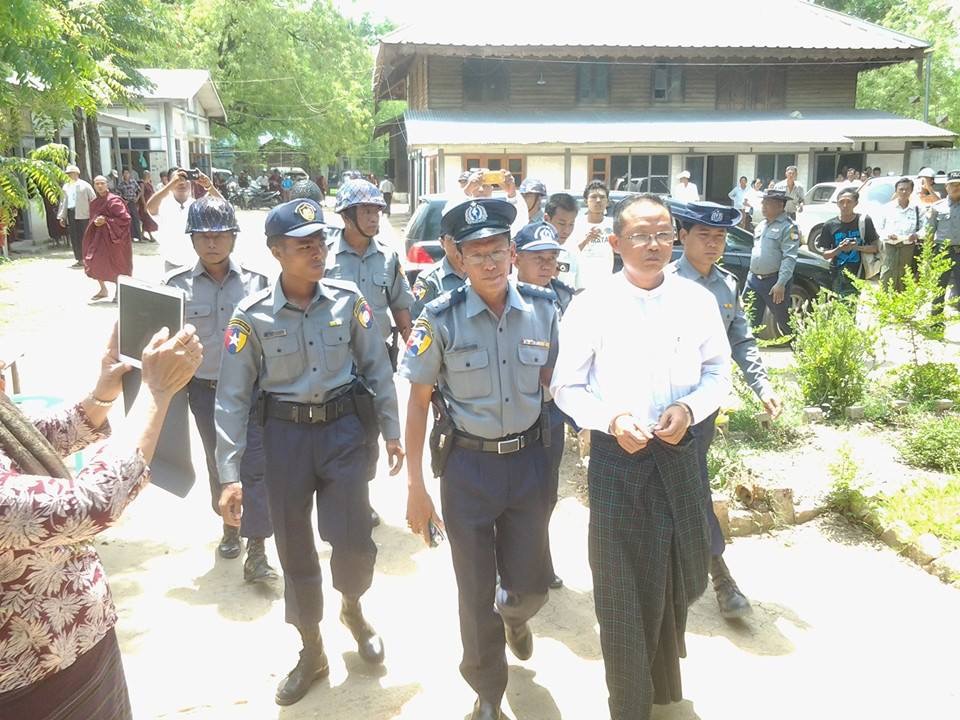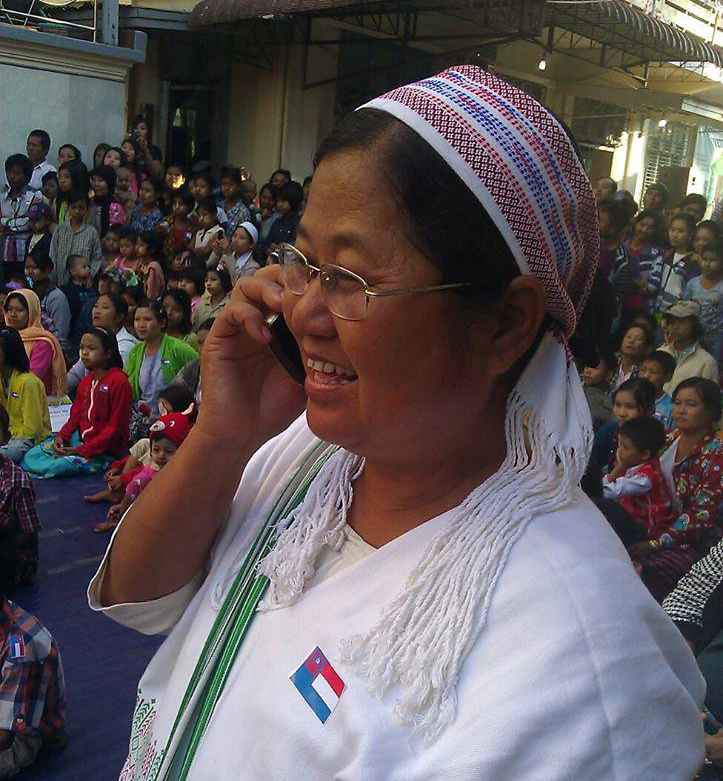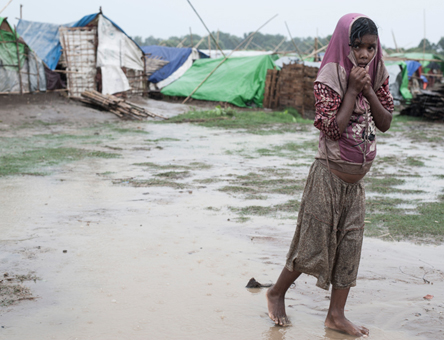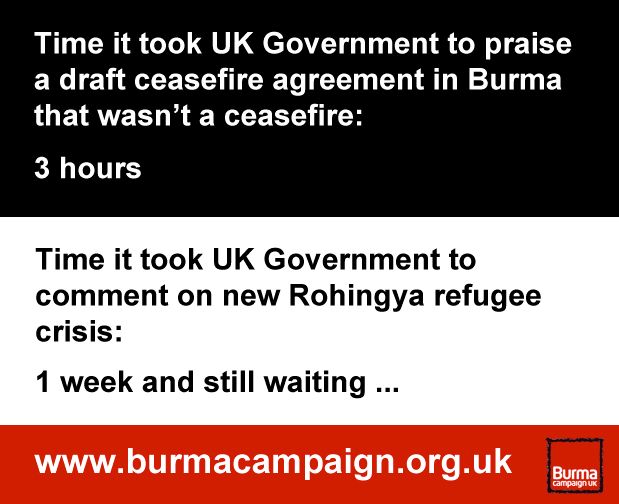In Focus: Rohingya persecution in Myanmar ‘is ethnic cleansing’
International Business Times UK spoke with Anna Roberts, executive director at Burma Campaign UK, about the persecution of the Rohingya which has reportedly lead to massacres.
See the interview and article here.
Activists outraged as Myanmar jails writer for Buddhist insults
Our campaign to free political prisoner Htin Lin Oo is featured in this Reuters’ article:
Myanmar’s government “should be encouraging writers like Htin Lin Oo to promote interfaith tolerance in the country, rather than sending him to jail,” Wai Hnin of the Burma Campaign UK said in a statement.
Minister worked as spin doctor for tobacco giant that paid workers £15 a month
Quoted in The Observer today:
The employment minister, Priti Patel, was part of a team of spin doctors paid hundreds of thousands of pounds to help a tobacco giant counter negative publicity, including that surrounding its joint venture with one of the world’s most brutal military regimes.
“BAT’s factory in Burma was jointly owned with the military dictatorship and so helped fund one of the most brutal military dictatorships in the world,” said Anna Roberts, executive director at Burma Campaign UK. “BAT refused to admit how much money it gave to the dictatorship, but Burma Campaign UK estimated that BAT paid the generals $16m (£10m) in taxes alone between 1999 and 2002. In contrast, BAT paid its factory workers in Burma just £15 a month. The dictatorship spent 40% of its budget on the military.”
Nations meet for migrant talks
“The Myanmar government has already played a clever tactical game. By first casting doubt about attending the summit, then agreeing to, they are being praised just for turning up. ASEAN members have now toned down their criticism of Myanmar’s anti-Rohingya policies for fear Myanmar might pull out”. Mark Farmaner, Director of Burma Campaign UK is quoted in the Myanmar Times.
You can read the full article here.
British campaign group calls for action on protest law
Wai Hnin, Campaigns Officer of Burma Campaign UK is quoted in Mizzima. “Naw Ohn Hla has been jailed numerous times simply for her peaceful political activities. There are many activists like her who still face arrest and harassment by Thein Sein’s government,” said Wai Hnin, Campaigns Officer at Burma Campaign UK. “The government uses repressive laws to intimidate and jail political activists like Naw Ohn Hla. The issue of politicalprisoners will remain a big problem unless all repressive laws are repealed in the country.”
NGOS urge Ban Ki-moon to negotiate aid access to Rakhine State
Our statement calling on Ban Ki-moon to negotiate access for humanitarian aid in Rakhine State is featured in Mizzima News:
“Twenty-seven international humanitarian aid and advocacy organisations have written today, 20 May, to the United Nations Secretary-General, urging him to give his “personal attention” to the humanitarian crisis in Rakhine State, Myanmar (Burma) and to take “a personal lead” in negotiating for humanitarian access to all areas of Rakhine State.
In an open letter, the NGOs quote the UN Assistant General-Secretary for Humanitarian Affairs, Kyung-hwa Kang, who said after visiting camps for internally displaced people in Rakhine State in June 2014 that: “I witnessed a level of human suffering in the IDP camps that I have personally never seen before … appalling conditions …. wholly inadequate access to basic services including health, education, water and sanitation.”
Scandalous treatment of Rohingya
A letter from Glenys Kinnock, member of the House of Lords and Patron of Burma Campaign UK, is in The Guardian:
Tahmima Anam (This migrant crisis will change our world, 20 May) is right. The root causes of the Rohingya boat people’s crisis must be addressed with greater breadth and urgency. It is welcome news that Indonesia and Malaysia have finally agreed to allow thousands of desperate Rohingya refugees stranded in boats at sea to land. The danger now, however, is that international attention will move on, and the root causes of the crisis will continue to be neglected.
Among the most important of those causes is the Burmese government’s deliberate, merciless policy of using a combination of brutal repression and abject poverty to drive the long-established Rohingya minority out of Burma. As part of that, their inhumane restrictions on international aid efforts by NGOs mean that camps in Burma sheltering 140,000 Rohingya who fled attacks in 2012 have been described by UN officials as having the worst conditions in the world. It is time UN secretary general Ban Ki-moon personally took the lead in negotiating free humanitarian access to these desperate people. The British and other EU governments should give him their full support in such a diplomatic effort, not least in mobilising pressure to secure change in the policies of the Burmese regime. Without that, the appalling misery and loss of life which has at last generated world interest will continue and worsen.
Glenys Kinnock
Labour, House of Lords
UK Government response to new Rohingya refugee crisis
Rohingya Refugee Crisis Is a Policy Success for President Thein Sein
Article in Huffington Post today by Mark Farmaner, director at Burma Campaign UK:
“Thousands of Rohingya refugees from Burma lie starving in boats off the coasts of Thailand, Indonesia and Malaysia. Dehydrated and desperate, they are forced to drink their own urine in sight of countries which should be offering them sanctuary.
Attention is rightly focussed on these countries for refusing to accept these refugees, and on the traffickers who abandoned them there. These countries must allow the boats to land and give sanctuary to Rohingya refugees. Action also needs to be taken against traffickers and the authorities which co-operate with them.
However, without tackling the root causes of this crisis, Burma’s persecution of the Rohingya, there will be no long term solution.
The simple truth is that the government of Burma has a policy of trying to drive the Rohingya out of the country. Boat loads of trafficked Rohingya heading for other countries are exactly what they want to see. For President Thein Sein, this is a policy success.”
Can Myanmar afford to burn coal?
Article in Myanmar Times by Mark Farmaner, director at Burma Campaign UK:
“For most people in Myanmar, who have no electricity supply or an unreliable supply, this might seem like good news. But can Myanmar, which ranks second as the country most vulnerable to climate change and natural disasters, afford to go down the path of fossil-fuel power generation? And will most ordinary people benefit from this kind of power generation?”





